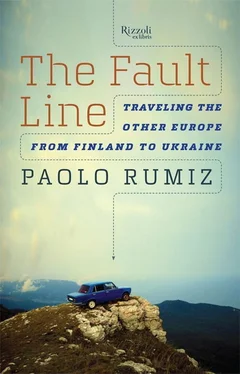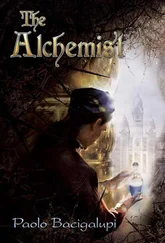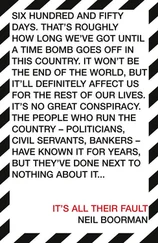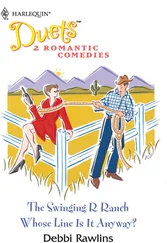Confirmation of this arrives on the padded stairs of the little hotel where we have found a room. They are inhabited by oil portraits of armed men who appear to be modeled on the stereotype of the cutthroat Turk. But as soon as I read the labels on the frames, I discover that they portray instead the most ardent adversaries of the Sublime Porte, the Cossacks. The faces looking at me are those of their historical leaders: the hetmans—the bald Severyn Nalyvaiko, the grim Maxym Zalizniak, the one-eyed Danylo Apostol. Beyond the landing, I’m ogled by the fat Pavlo Polubotok and the proud Bogdan Khmelnytsky, the most famous of all. As on other European frontiers—Croatia and Poland, for example—the defenders of the nation seem as though they try their damnedest to resemble their worst enemies.
We walk into the sunset on a stone stairway that leads down to the river toward a small wooden Orthodox church flanked by majestic trees. Kamianets is still aflame in sunlight, a Greek sunlight. But down by the river there is shade and cool air. On the banks, a dozen houses surrounded by greenery and a great swooping of swallows. This is the neighborhood called Karavasari, because once, many years ago—as the locals tell it—a Jewish woman named Sara lived here and turned it into a stopping place for caravans. Over time, the two words were joined together, and Karavan, joined with Sara, became Karavasari.
An elderly couple is relaxing on the grass, enjoying the cool air. He rolls himself a cigarette and plays with some white doves that he has just liberated from a dovecote. She has a crutch, a cane, and three thin ropes with which, standing still as though at the center of a spiderweb, she manages to govern the grazing of three kid goats whose collars are attached to the ropes. Above the two, way high up, the battlements of the fortress tinted orange. They are Viktor and Lyuba, next-door neighbors, born and raised in Karavasari.
All it takes is a “Good evening” from Monika, and they start talking to us as though that was all they had been waiting for. They start with the genesis of the place. All elderly Russians begin their stories from way back when.
Viktor points out the vertical rocks that stand way over our heads, a bit like the cave dwellings of Matera or of Chaco Canyon in Navajo country, rimmed by the last orange glow of sunset.
“Look, that used to be sea…. Genesis doesn’t lie; the Flood did all this. It fashioned the white rocks from which the city was built, its walls, its cathedral, its castle.”
“The ships on the Dniester came up this far; the river was much deeper then,”
Lyuba recounts, hobbling over toward the river on her crutch. The vertical rocks between the castle and the river form a natural amphitheater, and her voice carries, full and round, in the perfect acoustics of the place. Flowing water, screeching swallows, legions of croaking frogs. In the distance, barking dogs and shouting children multiplied by the echo of the cliffs. On the other side of the river, a group of men is fixing the bridge over the mouth of a torrent. I can hear their laughter. Chimneys are smoking. The smell of soup is carried on the breeze.
Lyuba: “A hundred and fifty thousand Jews passed over that bridge up there, holding hands, surrounded by Germans. I even saw Byela, sweet Byela, who sold candy to children. We shouted to them: ‘Rise up! There are a lot of you! You can kill them!’ But they answered, ‘God will help us.’”
Viktor: “They killed them in a village not far from here, called Mikraion. The ground was red with blood.”
I ask if anyone was left alive after the German retreat in 1944. They tell me yes, but the last ones left twelve years later, in 1956, after Stalin died. At the time of the revolt in Hungary.
Viktor searches in his memory: “I remember Arkhip… Lyuba, Harik, who drove a taxi… Lonka, who had a mobile cinema and showed me the world when I was a kid.”
“There was also a Jewish market, here on the right side of the bridge,” Lyuba adds, “they sold some excellent cured meats.”
Monika listens, asks, translates, and takes pictures, all at the same time, without interruption. I don’t know how she does it. She’s captivated by this world, by what she calls “the people of God,” the creeds and the simple souls of the Other Europe to whom she has dedicated twenty years of her life. She passes her enchantment on to me.
“There’s goodness in your eyes,” the little lady with the goats tells her. She offers her some berries. “Eat them, they’re good for your heart. And drink from this spring here, the water is exquisite. Drink with your hands; don’t be afraid. Water is life.” It’s an invitation to both baptism and the Eucharist; an ancient ritual is carried out through her.
Karavasari, sunken in the shade, seems to be in touch with the profound. I feel as though I can hear the ancient voice of the earth. A drum, a slow pulsing. Lyuba herself is the earth, the black earth of the granary of Europe.
“The young don’t appreciate the countryside. They don’t make it fruitful, don’t make it live. That’s why Ukraine is poor. Look at the fields all around us. They could feed half the world… and instead they’re full of weeds. Who knows, maybe one day things will get better, but I won’t be around to see it.”
And Chernobyl?
“It changed everything. More and more people are dying of cancer. It didn’t used to be that way. Do lots of people die from cancer in Italy, too?”
“Yes, a lot of people die from cancer there, too.” We ask her how things were before, during Communism.
“With the USSR, there was more order. Sure, we were poor, but it was paradise here. Now it’s a mess. Everybody drinks too much, even the women. Morality has gone way down, and opportunities for work, too. Everyone thinks only about themselves. I like living on Earth with the others… the Earth belongs to everyone… What do you think? Am I wrong?”
No, Lyuba, you’ve got it right.
“I don’t know the world, but I know enough to understand that God gave us a wonderful Earth. Here there is so much land. All you have to do is take it and use it. It’s an immense gift, especially in times like these, when young people can’t find work. But land is hard work, and today nobody wants to work hard.”
Land and water— zemlya and voda —Lyuba repeats the two key words like a litany. They are the origin of everything, the genesis and the regeneration.
Monika asks Lyuba if she lives alone.
“Yes, I live alone. My daughter comes every now and again to bring me bread and semolina. Everything else I get from the garden. And my goats.”
What did you do for work?
“I was a schoolteacher for thirty years, then a custodian. But at school they didn’t know where to put the children—there were so many of them. Now the schools are closing because there aren’t enough. We’ve got eight million emigrants, the villages are full of empty houses.”
Viktor accompanies us to see the wooden church of Karavasari, directly under the castle.
“Take a good look at it. It doesn’t have even a single nail. Iron was not to be used, as on the old boats. Iron had pierced the flesh of Our Lord. It was built with joints. There’s no cement, either, but look how solid it is. Today, they’ve buried us in tons of cement, and look at how everything is falling apart.”
Under the castle walls, there is a small fountain of pure water. The underground vein is the same one that allowed defenders of the city to hold out without having to draw water from the river. The Turks were the ones who opened it laterally so the inhabitants of Karavasari could draw from it freely.
Viktor recounts that, during the retreat of 1944, one of the German soldiers hid inside the niche of the fountain. The Russians killed him, and some bullets are still stuck inside the rocks. He shows them to us.
Читать дальше












